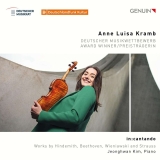Ihrem Alter entsprechend hat die Geigerin Anna Luisa Kramb ein frisches Programm für ihre Einspielung ausgewählt. Die Sonate von Hindemith, op. 31, Nr. 2, mit dem Titel « Es ist so schönes Wetter draußen…“ ist eine Solosonate. Die Frühlingssonate von Beethoven spielt vom Titel her in der Jahreszeit, die auch einen Aufbruch im Jahr verheißt. Diese Sonate passt thematisch auch zur Debut-Aufnahme, die Kramb als Teil des Preisgewinns beim Deutschen Musikwettbewerb in der Edition Primavera zugesprochen bekommen hat.
Die Beethoven-Sonate spielen Kramb und Pianist Jeonghwan Kim im Kopfsatz mit leichter Hand und gleichzeitig voranschreitend. Das folgende Adagio lesen sie als keimendes zartes Pflänzchen. Das kurze Scherzo hüpft frohlockend davon, bevor der Schlusssatz mit solidem Charme angeboten wird. Auch in der Solosonate von Hindemith, die dieser im April mit Blick auf den Monat Mai geschrieben hatte, vermittelt Kramb diesen leichten Gestus, ohne etwas unnötig zu beschweren.
Einzig die Fantasie brillante über Themen aus der Oper Faust von Gounod mag ein für eine junge Dame überraschendes Sujet sein. Mit den technischen Merkmalen stellt sie aber andere und damit ergänzende Herausforderung für ein Debut an die Interpretin als die Sonaten. Aber auch hier geht Kramb einer wirkungsvoll zirzensischen Darbietung aus dem Weg. Vielmehr bietet sie eine dezidiert mit Ruhe ausgearbeitete Auslotung an, die kaum einmal aus sich heraus geht. Es ist ihr also abhold, es krachen zu lassen. Das ist an sich kein Manko, zeigt sie doch abwechslungsreiche Ausgestaltungen. Aber ein wenig mehr Prickeln würde man nicht vermissen. Die Walzersequenz aus dem Rosenkavalier lässt Walzerflair erkennen.
Kramb liefert auf handwerklich sehr hohem Niveau gestaltete Interpretationen, die wegen der jugendlichen Zurückhaltung der Geigerin ein wenig an Farbe und Intensität vermissen lassen. Außerdem geht sie punktuell ihr Spiel mit weniger Stringenz an, als es wünschenswert wäre. Im Zusammenspiel mit dem Pianisten Jeonghwan Kim zeigen beide ein gut abgestimmtes Miteinander.
In keeping with her age, violinist Anna Luisa Kramb has chosen a fresh program for her recording. The sonata by Hindemith, op. 31, No. 2, entitled « Es ist so schönes Wetter draußen… » is a solo sonata. Beethoven’s Spring Sonata, from its title, plays in the season that also promises a new beginning in the year. This sonata also thematically fits the debut recording that Kramb was awarded as part of the prize win at the German Music Competition in the Primavera edition.
They play the Beethoven Sonata, incidentally with Jeonghwan Kim as pianist for the duo works, in the opening movement with a light hand and at the same time moving forward. They read the following Adagio as a germinating tender plant. The brief Scherzo bounces away exultantly before the final movement is offered with solid charm. Kramb also conveys this light gesture in Hindemith’s solo sonata, which the latter had written in April with an eye to the month of May, without weighing anything down unnecessarily.
Only the Fantasie brillante on themes from the opera Faust by Gounod may be a surprising subject for a young lady. With its technical characteristics, however, it poses a different and thus complementary challenge to the interpreter for a debut than the sonatas. But here, too, Kramb avoids an effectively circus-like performance. Rather, she offers a decidedly calmly worked out fathoming that hardly ever goes out of its way. So it is averse to her to let it crash. This is not a shortcoming in itself, since she shows varied interpretations. But one would not miss a little more sparkle. The waltz sequence from Der Rosenkavalier reveals waltz flair.
Kramb delivers interpretations of a very high level of craftsmanship that lack a bit of color and intensity because of the violinist’s youthful restraint. In addition, she approaches her playing at points with less stringency than would be desirable. In the interplay with pianist Jeonghwan Kim, both show a well-matched cooperation.






















